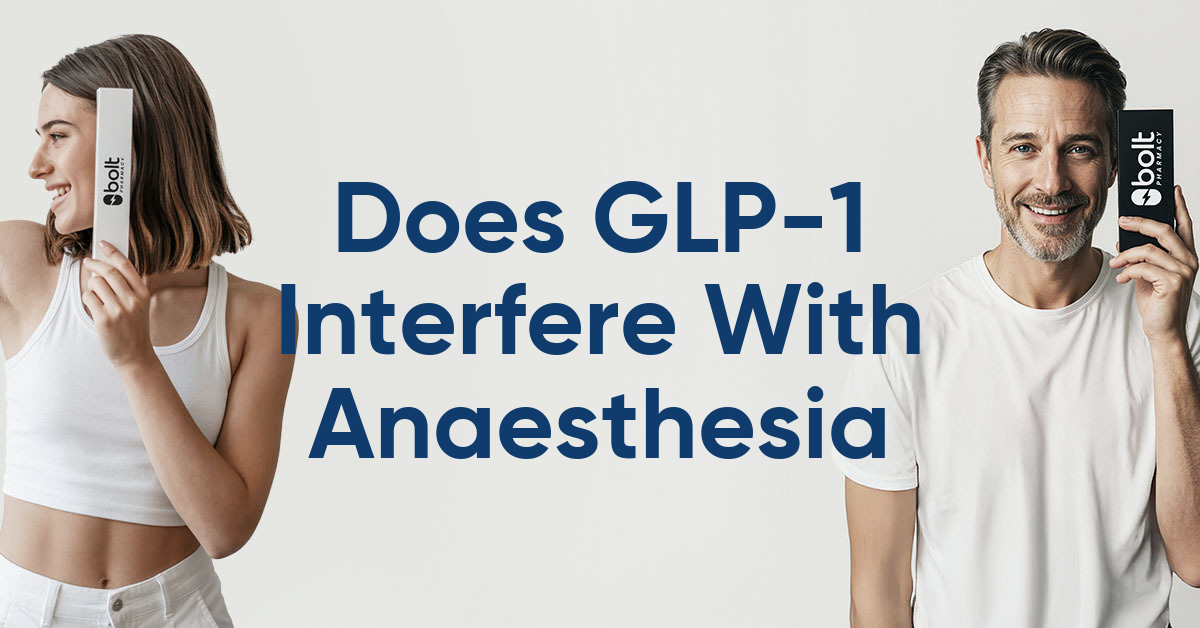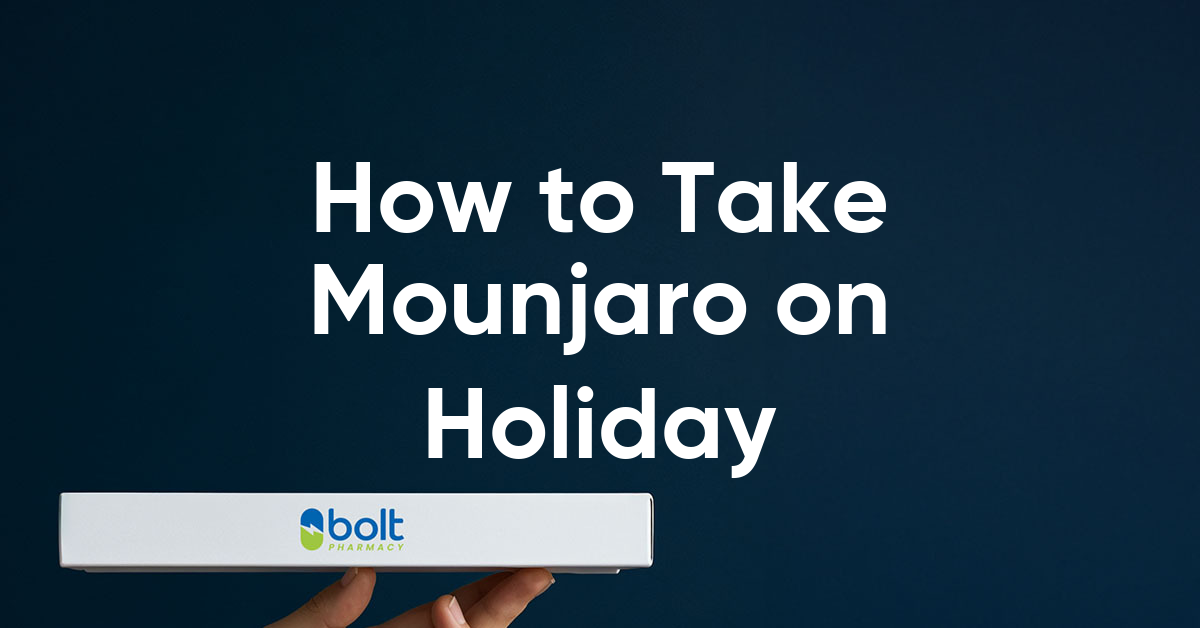GLP-1 receptor agonists, such as semaglutide and liraglutide, are increasingly prescribed for type 2 diabetes and weight management in the UK. A common concern for patients scheduled for surgery is whether GLP-1 medications interfere with anaesthesia. Whilst these medications do not directly interact with anaesthetic drugs, they can significantly delay gastric emptying, potentially increasing the risk of aspiration during general anaesthesia. Understanding how GLP-1 affects perioperative safety and following individualised guidance from your surgical team is essential for safe anaesthetic management.
Summary: GLP-1 medications do not directly interfere with anaesthetic drugs but can delay gastric emptying, increasing aspiration risk during general anaesthesia.
- GLP-1 receptor agonists slow gastric emptying, potentially leaving food in the stomach beyond standard fasting periods.
- There is no pharmacological interaction between GLP-1 medications and anaesthetic agents themselves.
- UK guidance recommends individual risk assessment rather than universal cessation before surgery.
- Higher-risk patients may require temporary pausing: daily injections 24 hours before, weekly injections 7 days before surgery.
- Anaesthetists may use gastric ultrasound, rapid sequence induction, or extended clear-fluid diets to manage aspiration risk.
- Patients must inform their surgical team and anaesthetist about GLP-1 use during preoperative assessment.
Table of Contents
What Are GLP-1 Medications and How Do They Work?
Glucagon-like peptide-1 (GLP-1) receptor agonists are a class of medications primarily prescribed for the management of type 2 diabetes mellitus and, more recently, for weight management in adults with obesity or overweight with comorbidities. Common examples available in the UK include semaglutide (Ozempic, Wegovy, Rybelsus), dulaglutide (Trulicity), liraglutide (Victoza, Saxenda), and exenatide (Bydureon).
These medications work by mimicking the action of the naturally occurring incretin hormone GLP-1, which is released from the intestine in response to food intake. The mechanism of action involves several key effects:
-
Enhanced insulin secretion from pancreatic beta cells in a glucose-dependent manner, which helps lower blood glucose levels without causing hypoglycaemia when glucose levels are normal
-
Suppression of glucagon release from pancreatic alpha cells, reducing hepatic glucose production
-
Delayed gastric emptying, which slows the rate at which food leaves the stomach and enters the small intestine
-
Increased satiety through central nervous system effects, leading to reduced appetite and food intake
The delayed gastric emptying effect is particularly relevant in the perioperative setting. By slowing the movement of stomach contents, GLP-1 medications can significantly delay gastric emptying, with the effect being most pronounced during dose escalation. This effect varies between individuals and tends to diminish over time with continued use (tachyphylaxis). This pharmacological action has important implications for patients scheduled to undergo surgical procedures requiring anaesthesia, as it may increase the risk of aspiration (inhalation of stomach contents into the lungs) during anaesthetic induction or recovery.
Patients at highest risk include those in the dose-escalation phase, experiencing active gastrointestinal symptoms (nausea, vomiting, bloating), those with known gastroparesis, or those taking concurrent medications that further delay gastric emptying (such as opioids).
UK Guidance on GLP-1 Use Before Surgery
Several UK professional bodies have issued guidance regarding GLP-1 receptor agonists in the perioperative period, reflecting growing clinical experience and emerging evidence. The Association of Anaesthetists, in collaboration with the Royal College of Anaesthetists (RCoA), Centre for Perioperative Care (CPOC), and the Joint British Diabetes Societies (JBDS), has published recommendations addressing the management of patients taking these medications before surgery.
Current UK professional guidance emphasises:
-
Patients should inform their surgical team and anaesthetist that they are taking a GLP-1 medication as soon as surgery is planned
-
Healthcare professionals should specifically ask about GLP-1 use during preoperative assessment, as patients may not recognise these medications as relevant to their surgery
-
The decision to continue or pause GLP-1 therapy should be made on an individual risk-based assessment, considering the type of surgery, the specific GLP-1 agent, dose escalation status, presence of gastrointestinal symptoms, and the patient's clinical circumstances
-
Many patients can safely continue GLP-1 medications perioperatively with appropriate precautions, while those at higher risk may benefit from temporary cessation
The Summary of Product Characteristics (SmPC) for GLP-1 medications notes the delayed gastric emptying effect, which anaesthetists consider when planning perioperative care. Many NHS trusts have developed local protocols based on national recommendations, and patients should follow the specific guidance provided by their surgical team.
It is important to note that guidance continues to evolve as more data becomes available. Patients should always follow the specific advice provided by their surgical team and anaesthetist, which will be tailored to their individual circumstances and local NHS Trust protocols, rather than making independent decisions about stopping medications.
When to Stop GLP-1 Before an Operation
The decision to stop GLP-1 medications before surgery is increasingly based on individual risk assessment rather than universal recommendations. Current UK practice adopts a risk-stratified approach, with many patients able to continue their medication while implementing additional precautions.
Risk factors that may influence the decision to pause treatment include:
-
Being in the dose-escalation phase of GLP-1 therapy
-
Experiencing active gastrointestinal symptoms (nausea, vomiting, bloating)
-
Having known gastroparesis or other conditions affecting gastric emptying
-
Taking concurrent medications that further delay gastric emptying (e.g., opioids)
-
Undergoing procedures with higher aspiration risk (e.g., emergency surgery, airway surgery)
If your anaesthetist or surgical team advises temporary cessation based on your individual risk assessment, the timing will depend on the specific medication:
-
Daily injections (such as liraglutide): Typically paused 24 hours before surgery
-
Weekly injections (such as semaglutide, dulaglutide): Often paused with the last dose given at least 7 days before surgery
-
Oral semaglutide (Rybelsus): Usually paused 24 hours before surgery
However, these timings may vary according to local NHS Trust protocols and individual clinical assessment. It's important to understand that even after stopping the medication, delayed gastric emptying may persist in some individuals.
For patients with diabetes who are advised to stop their GLP-1 medication:
-
You should receive specific guidance on alternative glucose management during this period
-
Blood glucose monitoring may need to be increased
-
Temporary adjustments to other diabetes medications might be necessary
-
Follow the JBDS perioperative diabetes management guidance or your local Trust protocol
For emergency surgery, stopping GLP-1 medications in advance is not possible, and anaesthetists will take additional precautions to manage aspiration risk.
Always follow the specific instructions provided by your healthcare team, which will be tailored to your individual circumstances and the nature of your planned procedure.
Does GLP-1 Interfere with Anaesthesia?
GLP-1 receptor agonists do not directly interfere with anaesthetic drugs themselves—there is no known pharmacological interaction that affects how anaesthetic agents work or are metabolised, as confirmed in the Summary of Product Characteristics (SmPC) for these medications. However, these medications can significantly impact the safety of anaesthesia delivery through their effect on gastric emptying, which is a critical consideration in anaesthetic practice.
The primary concern relates to aspiration risk. During general anaesthesia or deep sedation, protective airway reflexes are suppressed, and if stomach contents are present, there is a risk of regurgitation and aspiration into the lungs. This can lead to serious complications including aspiration pneumonitis (chemical injury to lung tissue), aspiration pneumonia (infection), acute respiratory distress, or even death in severe cases. Standard preoperative fasting guidelines (typically no food for 6 hours and clear fluids up to 2 hours before anaesthesia) are designed to ensure the stomach is empty. However, GLP-1 medications can delay gastric emptying such that food remains in the stomach beyond these fasting periods, potentially rendering standard fasting protocols insufficient.
Clinical reports and case series have documented instances of retained gastric contents found during anaesthetic induction in patients taking GLP-1 medications who had followed standard fasting instructions. While the evidence is largely based on case reports and physiological rationale rather than large controlled studies, this has led to increased awareness and the development of specific management strategies.
Anaesthetic management strategies may include:
-
Point-of-care gastric ultrasound to assess stomach contents before proceeding with anaesthesia
-
Use of rapid sequence induction techniques with cricoid pressure to minimise aspiration risk
-
Clear-fluid diet for 24 hours before surgery in higher-risk patients
-
Consideration of regional or local anaesthesia alternatives when appropriate
-
In some cases, postponement of elective surgery if significant gastric contents are identified
There is no evidence that GLP-1 medications affect the efficacy of anaesthetic drugs, alter consciousness levels, or interfere with post-operative recovery in ways unrelated to aspiration risk. The medications do not affect how quickly patients wake from anaesthesia or increase the risk of anaesthetic awareness.
Patients should inform their anaesthetist if:
-
They have continued taking GLP-1 medication closer to surgery than recommended
-
They experience symptoms such as nausea, bloating, or feeling unusually full
-
They have any concerns about their medication management
By following the individualised advice from your anaesthetic and surgical team, the risk of complications can be substantially reduced whilst maintaining the important metabolic benefits these medications provide in the longer term. If you experience any suspected side effects from your GLP-1 medication, you can report these through the MHRA Yellow Card Scheme.
Frequently Asked Questions
Can I continue taking my GLP-1 medication before surgery?
Many patients can safely continue GLP-1 medications with appropriate precautions, but the decision depends on individual risk factors including dose escalation status, gastrointestinal symptoms, and type of surgery. Your anaesthetist and surgical team will provide tailored advice based on your specific circumstances.
Why are GLP-1 medications a concern for anaesthesia?
GLP-1 medications delay gastric emptying, which means food may remain in the stomach longer than expected despite standard fasting. This increases the risk of aspiration (inhalation of stomach contents into the lungs) during general anaesthesia when protective airway reflexes are suppressed.
How long before surgery should I stop my weekly GLP-1 injection?
If your anaesthetist advises temporary cessation, weekly GLP-1 injections such as semaglutide or dulaglutide are often paused with the last dose given at least 7 days before surgery. However, timing varies according to individual risk assessment and local NHS Trust protocols, so always follow your surgical team's specific instructions.
The health-related content published on this site is based on credible scientific sources and is periodically reviewed to ensure accuracy and relevance. Although we aim to reflect the most current medical knowledge, the material is meant for general education and awareness only.
The information on this site is not a substitute for professional medical advice. For any health concerns, please speak with a qualified medical professional. By using this information, you acknowledge responsibility for any decisions made and understand we are not liable for any consequences that may result.
Heading 1
Heading 2
Heading 3
Heading 4
Heading 5
Heading 6
Lorem ipsum dolor sit amet, consectetur adipiscing elit, sed do eiusmod tempor incididunt ut labore et dolore magna aliqua. Ut enim ad minim veniam, quis nostrud exercitation ullamco laboris nisi ut aliquip ex ea commodo consequat. Duis aute irure dolor in reprehenderit in voluptate velit esse cillum dolore eu fugiat nulla pariatur.
Block quote
Ordered list
- Item 1
- Item 2
- Item 3
Unordered list
- Item A
- Item B
- Item C
Bold text
Emphasis
Superscript
Subscript












